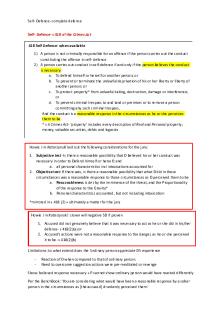Summary of Chapter 1- Developing Self Awareness PDF

| Title | Summary of Chapter 1- Developing Self Awareness |
|---|---|
| Author | Iftakhar Ifty |
| Course | Compensation |
| Institution | University of Regina |
| Pages | 2 |
| File Size | 105.1 KB |
| File Type | |
| Total Downloads | 110 |
| Total Views | 138 |
Summary
Download Summary of Chapter 1- Developing Self Awareness PDF
Description
Developing Management Skills NAME: IFTAKHAR - UL - ALAM
Student Number: 200439122
Summary of: Developing Self-awareness Chapter 1
Self-awareness requires a perception of several facets of one's self. Self-knowledge is a vital pillar for overall personal competence and other organizational capabilities, such as the development of strategies and goals and the control of resources and time. The sensitive line applies to how protected or defensive people are when they get the knowledge that is conflicting with their definitions. The sensitive line may also be found when pressure is applied to adjust the actions. The reaction to threats-rigidity response applies to the way people react to circumstances or knowledge of danger. Discrepancies of self-information may also be interpreted as risks. People tend to be strong, static, protective, and defensive when they come across such details. You respond with first learning and improved behaviors. Crossing the delicate line will establish this static response, which makes it difficult for people to consider and appreciate their input. There are at least two ways in which individuals can build selfawareness and overcome sensitive line problems. The first one would be, by the collection of verifiable, reliable, and controllable details (including inconsistency of facts). In this respect, accurate and credible analyses are given in the text support. Another way is, by contact with others and self-disclosure. The activities in the text include secure and organized selfdisclosure opportunities. In this Chapter, knowledge of self-awareness can be used to learn and treat oneself better, and to understand how variation can be handled, respected, and used (not distinctions). Since individuals prefer instinctively to associate with people like themselves, it can be a way to build trustworthy relationships with various people where they respect and accept their differences.
Self-knowledge includes several mental elements, including different types of intelligence (cognitive, physical, psychological, etc.) and various factors about personality. The text reflects on five main self-awareness fields that are specifically linked to successful management. These regions are also the center of the self-concept, collectively. There are 5 core aspects of self-awareness: 1. Core self-evaluation: This suggests that each individual established a fundamental appraisal of himself. 2. Emotional intelligence: It reflects the capacity of others and yourself to identify, perceive, and treat emotional signs. 3. Values: In this one, the basis on which attitudes and human desires are based on and help define morality or what is "good" 4. Attitudes toward change: By this aspect, we should also be mindful of your inclination towards transition and draw entirely on the attributes of your cognitive style. 5. Cognitive style: Through this aspect of self-awareness we get to see A person's ability to perceive, understand, and react in any way to the information.
Reference: Whetten, D. A., & Cameron, K. S. (2016). Chapter 1: Developing Self Awareness. In Developing management skills. Harlow, Essex, England: Pearson....
Similar Free PDFs

Chapter 1 - summary of CH 1
- 4 Pages

Chapter 18 Developing Talent
- 22 Pages

Self reliance debate - Summary
- 9 Pages

Self Reliance Summary
- 2 Pages

Hazardous Materials Awareness 1
- 12 Pages

Module 1 self test chapter 1
- 12 Pages
Popular Institutions
- Tinajero National High School - Annex
- Politeknik Caltex Riau
- Yokohama City University
- SGT University
- University of Al-Qadisiyah
- Divine Word College of Vigan
- Techniek College Rotterdam
- Universidade de Santiago
- Universiti Teknologi MARA Cawangan Johor Kampus Pasir Gudang
- Poltekkes Kemenkes Yogyakarta
- Baguio City National High School
- Colegio san marcos
- preparatoria uno
- Centro de Bachillerato Tecnológico Industrial y de Servicios No. 107
- Dalian Maritime University
- Quang Trung Secondary School
- Colegio Tecnológico en Informática
- Corporación Regional de Educación Superior
- Grupo CEDVA
- Dar Al Uloom University
- Centro de Estudios Preuniversitarios de la Universidad Nacional de Ingeniería
- 上智大学
- Aakash International School, Nuna Majara
- San Felipe Neri Catholic School
- Kang Chiao International School - New Taipei City
- Misamis Occidental National High School
- Institución Educativa Escuela Normal Juan Ladrilleros
- Kolehiyo ng Pantukan
- Batanes State College
- Instituto Continental
- Sekolah Menengah Kejuruan Kesehatan Kaltara (Tarakan)
- Colegio de La Inmaculada Concepcion - Cebu









